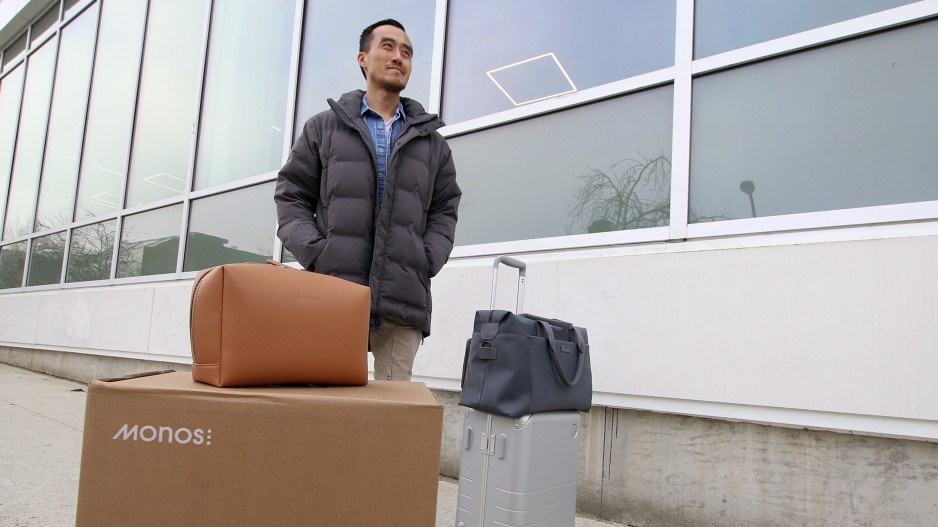Monos CEO Victor Tam's aim is to grow his Vancouver-based online luggage retailer into a US$1 billion market valuation within the next few years.
Given that Monos's value today is likely valued between US$30 million and US$40 million, that is an ambitious aim.
Tam's confidence in his company's burgeoning value may in part be because he was able to snag US$10 million in equity financing last month.
He sees Monos as becoming the next Vancouver retail success story – in league with Lululemon Athletica Inc. (Nasdaq:LULU), Aritzia Inc. (TSX:ATZ) and Herschel Supply Co.
Perhaps a better analogy for his aspiration, however, would be the online suit-seller Indochino, which has grown to have more than 50 showrooms. That comparison is a better fit because Monos aims to expand from being solely an online retailer to being one that also has stores across North America.
Lululemon and Aritzia both started with bricks-and-mortar stores, while Herschel's early expansion came via resellers and partners.
Monos generated about US$1 million in revenue in its first six months in operation, during the last half of 2019, Tam told BIV. It then increased sales by more than 300% annually in each of 2020 and 2021. Tam expects his company's annual sales growth rate to slow, but that sales will hit $50 million in 2022.
He would not reveal exactly how much of the company he and partners Hubert Chan and Daniel Shin sold to Venn Growth Partners and Strand Equity, but Tam said it was a "significant minority stake" – he and his partners maintain majority control.
Tam is a serial entrepreneur who had worked with BDC during past ventures. When he sought capital for Monos, he asked BDC to help him find investors, and that organization linked him with new contacts who steered him to Venn Growth Partners partner Cameron Pollard, he said.
Pollard told BIV that Venn Growth invested in Monos because he was impressed with its products and management team.
"I met for what was supposed to be a one-hour lunch with Victor, and that turned into an afternoon together, as we really hit it off," Pollard said. "I was incredibly impressed with Victor's knowledge of the space, his humility, and how he thinks about people and culture."
Pollard said that in a subsequent meeting he was able to touch and feel samples of Monos' luggage as well as competitors' similarly priced products.
"It was night and day," he said. "You've got a $250 bag, and it feels like $1,000 bag."
Monos Travel has 35 employees, in addition to the founders, and has been operating out of co-working space. Tam said the company plans in February to move to its own office on Manitoba Street.
The new capital will enable Tam to hire new executives and staff to help his company expand.
He is seeking a new head of "people and culture," as well as a new CFO.
"As numbers get more complicated, and we keep scaling, we want someone who's a little bit more experienced in that field," he told BIV.
Marketing and customer services staff are likely to be hired. So are retail staff for Monos' first bricks-and-mortar store, which is set to open by fall in Kitsilano.
Monos' story started in spring 2018, after Tam bought a suitcase online and was disappointed with the quality, he said.
He had a background designing items and selling them online, so he called on friends he had known since childhood – Chan and Shin – to join him building a new venture selling luggage online.
The trio invested about US$550,000 to get the ball rolling, and spent the next year attending luggage conventions, designing suitcases and investigating potential Chinese factories that could manufacture their products, Tam said.
Sales started in 2019 for two items that each came in two sizes, and in multiple colours.
The trio bought online advertising, and watched sales roll in.
"Then came the pandemic, and there were no flights, and lock downs that had no real end in sight," he said.
Monos had ordered substantial inventory that had not yet arrived, so its founders worked with their manufacturing partner to stagger payments.
They also pivoted. Tam and his team designed a disinfecting wand that users could hold over items to sanitize them. They also started to add other products to Monos' website, including clothing.
"We decided as a company that our strengths were in designing products, and manufacturing them and bringing them onto the market," Tam said.
The lion's share of Monos' revenue remains luggage, with about 70% of sales in the U.S., and the rest in Canada.
"Down the pipeline, we're definitely going to be doing a lot more partnerships with larger brands, and getting into partnerships with celebrities," Tam said. "Once we open the Vancouver store, we'll look to open in New York, California, and Toronto."
Kyle Vucko, who co-founded Indochino as an online suit-seller in 2006 and was CEO until the end of 2015, when the company had seven showrooms, told BIV that opening bricks-and-mortar stores can be vital for early-stage online-only ventures.
"There's a percentage of your market that needs to see and feel, and having a store helps those people out," Vucko said.
The valuable thing about having online sales, he added, is that customers provide delivery addresses, and it becomes clear which cities and neighbourhoods are most likely to have successful showrooms.
Selling direct to consumers is also the most profitable sales channel because it cuts out any middle players that would otherwise take cuts of the profit, Vucko added.
His strategy at Indochino was to first open pop-up stores that lasted for a few days, or weeks, to test markets. He said that depending on what the data says, and on available capital, permanent stores starting with short-term leases could be wise.
"If you've got the funding, and the online numbers are looking amazing, you could be a lot more bullish about opening stores," Vucko said. *




